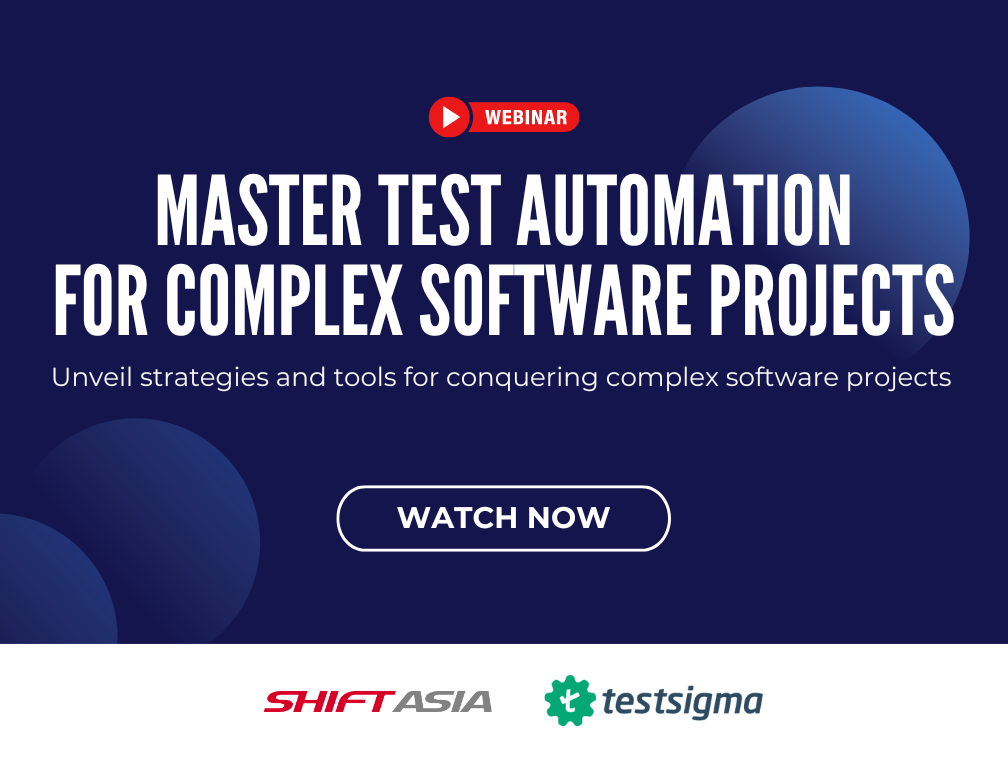Software Testing Automation is a revolutionary advancement in software testing, allowing for more cost-efficient and less time-consuming than traditional manual testing methods. By leveraging this technique, testers can reduce the time and effort invested as well as produce repeatable documentation of outcomes to improve overall quality assurance processes.
As software testing automation continues to surge in importance, the industry is seeing remarkable growth. Reportlinker forecasts that the automation testing market will expand from USD 24 billion to over USD 50 billion by 2027, displaying an impressive 16% Compound Annual Growth Rate (CAGR). In the recent blog, we have dove into the definition of software testing automation and the Top 7 Free Automation Testing Tools 2023. If you haven’t read them yet, jump over there before proceeding to today’s blog, where we’ll discuss the types of automation testing and all the misconceptions regarding this testing methodology.
Types of automation testing in software development
Knowing your options regarding software testing automation is critical in creating a comprehensive Quality Assurance program. Being familiar with the different types of automation tests available can help you decide which ones will yield the most effective results for your organization and its unique structure while giving you a comprehensive view of how in-depth such tests can go.
Below are the common types of automated testing, including unit tests, integration tests, end-to-end system/regression tests, keyword-driven tests, functional tests, and smoke or sanity checks. When used effectively, these tools help speed up the delivery process while ensuring quality throughout each stage of a project’s lifecycle.

Smoke Testing
Smoke testing is a form of software automation ensuring that the major components and functions are operational before further testing. It’s also known as Build Verification Testing or Confidence Testing, examining the recently built version for stability and viability before allowing it to progress through its test cycles.
Smoke testing must be done after adding all generated features into the current build. If a problem arises during this phase, an application can be returned directly to developers, providing time efficiency by eliminating additional feedback loops. Ultimately this step mitigates risk when continuing with further tests on released versions before broader deployment.
Functional Testing
Assessing the processes and features that make up an application to ensure they meet functional requirements. This method mainly utilizes the black box techniques – without insight into the source code – focusing on user interfaces, APIs, databases, security protocols, and other functionalities.
By supplying suitable inputs & comparing results to pre-defined specifications, this type of Quality Assurance Software technique verifies application performance across multiple conditions, conducted either manually or through automated solutions.

Unit Testing
Unit testing is a vital step in software development that helps developers identify issues before they become too ingrained into the code. It involves scrutinizing code components, known as units, to make sure they are working correctly and meet the standards intended by their creators.
Such thorough testing during production can save organizations significant time and expense when codes don’t perform up to par at later inspection stages. In effect, unit tests act like an extra set of eyes for teams producing complex applications – streamlining quality assurance processes while contributing towards higher overall product success rates.
Integration Testing
Integration Testing is an essential step in software testing automation. It allows engineers and developers to ensure that different modules developed by separate people interact correctly and without disruption when combined into a larger project. This process, known as I&T (Integration & Testing), String, or Thread Testing, focuses on data communication between these units for maximum efficiency of each part’s contribution to the whole system.
Keyword-driven Testing
Keyword-driven testing is a powerful automated functional testing strategy that allows test case design and development to be separated. Also referred to as action word-based or table-driven testing, it involves the usage of keywords that denote user actions on objects within tests; such as mouse clicks, keystrokes, or object selection; making them easier to understand, automate and maintain for both manual and automated processes.
Carefully selecting from an extensive list of appropriate keywords related to specified activities in the application under review brings immense benefit when conducting keyword-driven tests.
Regression Testing
Regression testing is essential for maintaining code stability and functionality during development. This software automation aims to ensure that recent changes don’t break previously existing features, ensuring all modifications are secure without compromising quality or performance.
By running a complete set of tests from previous versions in addition to newly added ones – developers can guarantee the success of their program updates before deployment!
Common misconceptions about software testing automation
As the demand for quality software grows, businesses are slowly favoring software automation testing techniques. Predictions indicate that this market has the potential of reaching $50 billion by 2027, almost triple its current value, and with good reason; automation offers significant benefits over manual processes – providing faster development cycles while decreasing costs as well as improving ROI.
Despite the rapid adoption of software testing automation, its full potential is being hindered by lingering misconceptions and prejudices. These false beliefs have created a self-imposed limitation on test automation’s capacity to expand into new areas, such as AI-assisted analysis and application performance optimization. These should be addressed to maximize automated testing strategies’ efficacy.
Automation shall free up your time
Automation can save significant amounts of time compared to manual testing, but it doesn’t always result in a specific amount of free hours. While automated tests are simpler and more streamlined than their manual counterparts, they still require considerable setup work. This includes spending effort writing the test and making subsequent modifications as needed.
However, once an automated test is complete, its code can be reused for future similar tasks, granting a substantial efficiency boost over repetitively running through the same steps manually each time such checks need to occur. Meaning manual testers won’t have to waste time on highly repetitive tasks but rather focus their attention on more challenging aspects of software development.
Automation testing is outrage expensive
Automated testing offers long-term cost savings, even for smaller companies initially concerned about the upfront investment.
Automated testing offers numerous benefits that help businesses save time and cut costs. By implementing automated tests, companies can focus on more significant aspects, such as customer satisfaction and functionality improvements, instead of wasting resources on multiple code revisions. Additionally, with parallel testing, you can slash your total test execution times by running simultaneous automated tests in place of sequential ones. Ultimately this leads to longer-term savings while improving overall software quality assurance standards.
Automated testing is better than manual testing
Automated and manual testing are two distinct processes, each with its own strengths. Manual testing is conducted manually by human testers to identify bugs in an application. This process requires attention to detail as the tester must thoroughly review all aspects of a program before drawing any conclusions. On the other hand, software testing automation can utilize specialized software to test multiple simulations quickly without requiring user action or technical intervention; this approach reduces time spent on mundane tasks while ensuring more comprehensive coverage than achieved through manual methods alone.
Manual and automated testing are complementary to one another. In reality, most automation systems’ functionalities are constrained, despite being well-developed and capable of carrying out complex activities in a much shorter amount of time. Automation systems are highly advanced but can only complete specific tasks they were programmed for and do not guarantee the exhaustive absence of code errors. Nor identify future bugs or guarantee complete error prevention, unlike manual testing.
Manual testing shall continue to be a necessary part of the process, especially when it comes to software assurance tests that require human logic and exploration. Although automated testing is undeniably beneficial in large-scale projects with lots of complexity, manual processes remain invaluable for ensuring accuracy and identifying potential bugs throughout multiple stages.
Getting your outsourcing software test automation services with in-house quality
Outsourcing software testing automation services - better or worse?
Formally recognized in the late 80s, outsourcing software testing automation services has become one of the most effective strategies many companies adopt nowadays. Businesses can take advantage of external resources to undertake specialized IT jobs, including software development, software testing automation, technical support, and infrastructure solutions from third-party suppliers.
The digital revolution has created opportunities for businesses to access specialized talent from the global market through IT outsourcing while avoiding the cost and time associated with hiring an in-house team. By taking advantage of this solution, you can gain valuable skill sets that are difficult or impossible to find locally, helping your company grow by leaps and bounds!
While you might be contemplating whether or not that outsourcing software testing automation service is worth it, many have taken the bold investment, which later saves them financially in the long run. Without external support, your development team must learn how to properly execute quality assurance tests from scratch without professional experience. Not only is this inefficient use of resources, but any mistakes or oversights on their part can lead to costly delays further down the line!
SHIFT ASIA's software testing automation services - a must-have provider
Among plenty outsourcing providers options out there, outsourcing your software test automation services to SHIFT ASIA is worth a try. From our advanced engineering skills, top-of-the-line tools, and highly effective quality assurance methods, our team of experts shall help you exceed your goals while keeping our attention on any issues related to quality that would be effectively addressed at all times. SHIFT ASIA provides various types of software testing automation services, such as:
GUI Automation
Graphical user interface test automation, also known as GUI automation, is a process that simplifies manual and time-consuming tests by using automation scripts, tools, and software to simulate user actions.
Regression Automation
With the high frequency of code changes, regression testing becomes crucial, especially for mobile apps. It verifies the user experience and helps to ensure that the app functions properly. Automating some of these efforts can optimize the time-consuming manual testing done by humans.
Automation Consulting
Although automation is often seen as a universal solution, it’s not always applicable as the feasibility of automating a process is highly dependent on the software’s structure and how changes are implemented. That’s why it takes an expert in automation solutions to determine feasibility, organize regression testing, and choose the appropriate tools to achieve the best outcome. So, don’t underestimate the importance of having a specialist on your team!
SHIFT ASIA’s software test automation services fit right in the picture as the perfect solution for your businesses who are confronting the software testing challenges puzzle. Overspending on manual testing? Lack of specialist resources? In need of re-assessing your current functional testing suite? Our experienced engineers are here to help. Assess your current testing suite, sorting out to optimize the process through a combination of comprehensive inspection, manual testing, and automation. Don’t let these testing obstacles hold you back, contact SHIFT ASIA’s today and ease away the burden of software test automation services altogether.

Though many believe that software testing automation answers all their efficiency-related problems, this could not be farther from the truth. This article has explored the question of “What is software testing?“, with a particular focus on software testing automation. It is clear that there are various types of software testing automation, each with its own set of advantages and disadvantages. Therefore, before implementing any automation into your testing strategy, you must first consult with a professional who shall assist you in understanding which type, or combination of multiple types, would be best for your specific needs. Outsourcing your software test automation services to such a vendor will result in higher proficiency and quality standards for your business, ensuring that your products are always up to par with industry standards.
ContactContact
Stay in touch with Us




